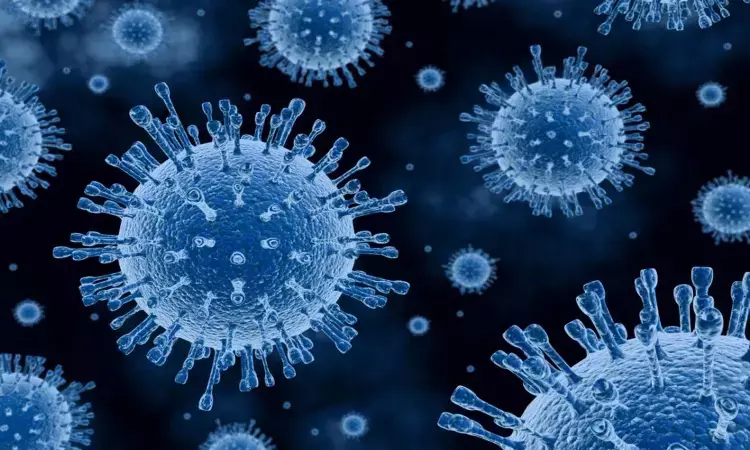- Home
- Medical news & Guidelines
- Anesthesiology
- Cardiology and CTVS
- Critical Care
- Dentistry
- Dermatology
- Diabetes and Endocrinology
- ENT
- Gastroenterology
- Medicine
- Nephrology
- Neurology
- Obstretics-Gynaecology
- Oncology
- Ophthalmology
- Orthopaedics
- Pediatrics-Neonatology
- Psychiatry
- Pulmonology
- Radiology
- Surgery
- Urology
- Laboratory Medicine
- Diet
- Nursing
- Paramedical
- Physiotherapy
- Health news
- Fact Check
- Bone Health Fact Check
- Brain Health Fact Check
- Cancer Related Fact Check
- Child Care Fact Check
- Dental and oral health fact check
- Diabetes and metabolic health fact check
- Diet and Nutrition Fact Check
- Eye and ENT Care Fact Check
- Fitness fact check
- Gut health fact check
- Heart health fact check
- Kidney health fact check
- Medical education fact check
- Men's health fact check
- Respiratory fact check
- Skin and hair care fact check
- Vaccine and Immunization fact check
- Women's health fact check
- AYUSH
- State News
- Andaman and Nicobar Islands
- Andhra Pradesh
- Arunachal Pradesh
- Assam
- Bihar
- Chandigarh
- Chattisgarh
- Dadra and Nagar Haveli
- Daman and Diu
- Delhi
- Goa
- Gujarat
- Haryana
- Himachal Pradesh
- Jammu & Kashmir
- Jharkhand
- Karnataka
- Kerala
- Ladakh
- Lakshadweep
- Madhya Pradesh
- Maharashtra
- Manipur
- Meghalaya
- Mizoram
- Nagaland
- Odisha
- Puducherry
- Punjab
- Rajasthan
- Sikkim
- Tamil Nadu
- Telangana
- Tripura
- Uttar Pradesh
- Uttrakhand
- West Bengal
- Medical Education
- Industry
Benefits of High-dose Blood Thinners in COVID-19 Patients Remain Unclear

Newswise - While COVID-19 infected patients should be treated with standard anticoagulation therapies, such as blood thinning medication, a new study by researchers at the George Washington University (GW) shows that anticoagulating patients at higher doses, without traditional medical indications to do so, may be ineffective and even harmful. The study was published in the journal Thrombosis Research.
"COVID-19 patients appear to have an increased incidence of blood clots. Many hospitals and health care providers began to use high doses of blood thinners to prevent these clots or treat them preemptively," said Juan Reyes, MD, MPH, co-author of the study and director of hospital medicine at the GW School of Medicine and Health Sciences (SMHS). "We wanted to review the data of our subset of COVID-19 patients treated with blood thinners to determine if the higher-dose medication was helpful."
"While it's true that COVID-19 patients could be dying of blood clots, the data we've evaluated does not support giving every patient a high dose of blood thinners. That's a challenge, as the benefits still remain unclear," said Lei Lynn, MD, first author of the study and assistant professor of medicine at GW SMHS. "We caution against an aggressive blood thinner regimen for everyone, unless there is clear evidence to do so."
At the beginning of the pandemic, all patients admitted with COVID-19 to the GW Hospital were treated with standard dose anticoagulation, unless contraindicated. As awareness of the elevated risk of blood clots developed, many providers began treating patients with high-dose blood thinners. At GW Hospital, for non-critically ill patients, medical teams were advised to especially consider initiating a high dose of anticoagulation if a patient's D-dimer level exceeded 3 micrograms per milliliter. The research team previously published a study finding higher levels of the biomarker D-dimer, a medical indicator found in the blood, is associated with higher odds of clinical deterioration and death from COVID-19. This study is the first of its kind to utilize D-dimer levels to analyze clinical outcomes of anticoagulation in patients who are not critically ill.
"Though we would have loved to have seen a clinical benefit to our patients from anticoagulation, our research found that higher doses of blood thinners were potentially harmful, with no clear benefits," said Karolyn Teufel, MD, co-author of the study and assistant professor of medicine at GW SMHS. "Our research highlights the challenges with treating COVID-19. So much remains unknown.
Hina Zahid Joined Medical Dialogue in 2017 with a passion to work as a Reporter. She coordinates with various national and international journals and association and covers all the stories related to Medical guidelines, Medical Journals, rare medical surgeries as well as all the updates in the medical field. Email: editorial@medicaldialogues.in. Contact no. 011-43720751
Dr Kamal Kant Kohli-MBBS, DTCD- a chest specialist with more than 30 years of practice and a flair for writing clinical articles, Dr Kamal Kant Kohli joined Medical Dialogues as a Chief Editor of Medical News. Besides writing articles, as an editor, he proofreads and verifies all the medical content published on Medical Dialogues including those coming from journals, studies,medical conferences,guidelines etc. Email: drkohli@medicaldialogues.in. Contact no. 011-43720751


